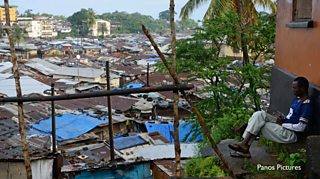Powerful and trusted: why radio is needed to fight Ebola
Caroline Nursey
Chief Executive Officer, �������� Media Action
Tagged with:
On first sight, Freetown seems little changed from my last visit four years ago - the same rich colours, smiling faces and warm welcomes.
And there are signs of continued recovery from the war and increased prosperity from rapid economic growth - 10% last year - to be seen in newly tarmacked roads, refurbished shops and new buildings.
Taking a second look, I realise that there aren't many children. Last time they were everywhere- crowding around the car, making their way to school or playing by the side of the road. All schools have been closed since the start of the academic year as part of the emergency measures to stop the spread of Ebola and parents are keeping children at home.

A densely populated area of Freetown, Sierra Leone
When I talk to colleagues in �������� Media Action, one of their main complaints is the difficulty of keeping children occupied while they are at work. And these are middle class people living in nice houses who can afford books, television and toys. For parents living in crowded conditions in the city’s poorer areas, the challenge of keeping children safely indoors is immense.
Restaurants and shops are open - though trade is down - but cinemas and places where people gather are all closed. Although mosques and churches still hold worship, the congregation don't shake hands or embrace and funerals - traditionally at the heart of West African culture - are not safe.
Main news source
So children stay at home without schooling and adults rush to work and back home with minimal social contact. And in this context, radio - already the main source of news – is now more important than ever.
During the three day stay at home that the Government initiated to help check Ebola, Media Action colleagues made three hours of Krio language programmes every day broadcast over 40 radio stations across Sierra Leone providing information that people needed. The 3,500 text questions received from audience members showed the level of their engagement.
But making such programmes is difficult. Poorly made programmes could do more harm than good. For example, phone-in shows are popular and cheap to make, but could help spread myths if those who phone in share false remedies. Even with an expert doctor on hand, it may be the assertion by a caller that drinking salt water, chlorine or rum offers protection that is remembered rather than its refutation.
Training for radio stations
So the Media Action team in Sierra Leone is running workshops for the staff of radio stations across the country where journalists can explore how best to make programmes in local languages for local people that help overcome Ebola.
These stations rebroadcast the Krio language national programmes that we make, but the best results will be achieved through their own programming that meets the particular local needs of each community. Funded by the British Government through the Department for International Development, we are working with a consortium of agencies to provide people with the information that they need and to encourage behaviour change through radio, face to face contact and by working with religious leaders.
Ghana, Mali and beyond
And this week, we have delivered a “Lifeline” Ebola workshop in Ghana exploring many of the same issues. There is no Ebola in Ghana and we all hope that there never will be, but preparedness training is critical so that radio stations and those working in media will be ready if they are needed.
Over the next few months, funded by the Paul Allen Foundation we will be delivering similar workshops in nine more countries across West Africa from Mali (which now has its second confirmed case) to Senegal (that succeeded in dealing with its one imported case) and Côte D'Ivoire (close to the outbreaks, but so far free of cases).
Radio is the best way to provide people with the information that they need to understand what Ebola is and to explain what to do if disease hits and it gives people a space to ask questions, raise concerns and share helpful stories. Radio remains the most trusted, far-reaching and powerful tool to bind communities together particularly at a time when people have to maintain a physical distance from each other, and schools and gathering places are closed.
Changing behaviour is far more complex and I will say more on this in my next blog.
